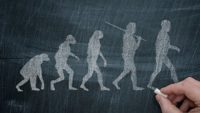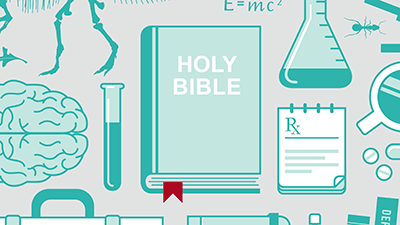By Ken Ham At its annual representative assembly earlier this month, the National Education Association (NEA) formally adopted a statement that endorses abortion. The NEA is the largest teachers’ union in the US. It’s tragically ironic that an organization that is supposed to support those who will teach the next generation of students endorses killing off the next generation of babies before they are born! The NEA declared that they will now include an assertion of our defense of a person’s right to control their own body, especially for women, youth, and sexually marginalized people. The NEA vigorously …read more [More]
By Sarah Chaffee “We don’t splice our DNA the same way chimps do,” says Dr. Ann Gauger. On this episode of ID the Future from the vault, she discusses human and chimpanzee genomes. Did you know that one stretch of DNA can code for multiple proteins? Listen in to learn more about how your DNA is different, and is expressed differently, than chimps! Your browser does not support playing Audio, please upgrade your browser or find our podcast on podOmatic Download Episode …read more Source: id the future
Doesn’t Genesis explain the “why” and ‘science’ the “how”? …read more Source: creation.com
By Ken Ham Want to discover how to more effectively share the gospel in our increasingly secular age and enjoy a great family vacation at the same time? Join us for Gospel Reset Mega Conference, November 21–23, 2019, in Niagara Falls—on the beautiful Canadian side of the Falls. You’ll hear from me, molecular geneticist Dr. Georgia Purdom, AiG-Canada director Calvin Smith, and evangelist Cory McKenna. And we’ll be on what most people say is the best side of the Falls—the Canadian side! It’s a beautiful area, with so much to do for individuals, couples, and families. Here are just …read [More]
By Ken Ham One of the biggest criticisms of biblical creation is, “Creationists don’t make testable predictions.” But that’s simply not true! Biblical creationists do make predictions—many of which have been confirmed by further research. Here are just a few of those predictions: The strength of several planets’ magnetic systems Helium in earth’s rocks The presence of radiohalos in metamorphosed sandstones Cold material from earth’s crust near the earth’s core The rapid reversal of earth’s magnetic field Harvard-trained scientist Dr. Nathaniel Jeanson, one of AiG’s research scientists, wrote Replacing Darwin, a book that challenges the evolutionary worldview with research from [More]
07/30/19 ‘The origin of species is exactly what Darwin cannot explain’ David Gelernter, a famed Yale University professor, has publicly renounced his belief in Charles Darwin’s theory of evolution, calling it a “beautiful idea” that has been effectively disproved. Gelernter, who is known for predicting the World Wide Web and has developed many complex computing tools over the years, is today a professor of computer science at Yale, chief scientist at Mirror Worlds Technologies, member of the National Council of the Arts, and a prolific author. In May, the Claremont Review of Books published a column [More]
Darwin’s real message-have you missed it? Some evolutionists really do understand its materialistic implications. …read more Source: creation.com
By Ken Ham My longtime, dear friend, Buddy Davis, celebrates his 70th birthday today. Happy birthday, Buddy! I’ve known Buddy, and his wife Kay, for half my adult life and they’ve been an integral and vital part of AiG and the Creation Museum. When you visit us, you’ll see Buddy’s sculpted dinosaurs throughout the museum. His dinosaurs are found throughout the museum and have been seen by millions of people. Many years ago (September 1994), AiG co-founders, Mark Looy, Mike Zovath, and I went to visit Buddy and Kay in their cabin way back in Amish country in Ohio after [More]
How reliable are the conclusions of historical science compared to experimental science? …read more Source: creation.com
By Dr. Terry Mortenson Creationists and evolutionists look at the same fossil and genetic evidence, but they interpret it very differently because of different starting assumptions. …read more Source: AIG Daily
By Ken Ham For two and a half years now, we’ve been airing a live news show, Answers News, from here at the Creation Museum in Northern Kentucky. What began with three co-hosts in our tiny recording studio has turned into a show with six co-hosts (rotating each episode), along with several recurring guests, on the stage in Legacy Hall at the Creation Museum before a live studio audience. Answers News has aired twice a week since its inception, but we’ve recently announced that beginning in August, we are switching to one episode a week—but don’t worry, it’s not bad [More]
By Heath Lambert The so-called “culture wars” have spilled into every field of study, not just origins. …read more Source: AIG Daily
By Sarah Chaffee On this episode of ID the Future, Bijan Nemati, formerly of CalTech’s Jet Propulsion Laboratory and now at the University of Alabama, Huntsville, tells what science is learning about how hard it is to find a planet like Earth. Anywhere. The more we learn about the conditions necessary for a planet to host life, the more we see we may need to search at least tens of thousands of Milky Way galaxies to expect to find another one–at least if it all depends on blind luck. This talk is part of bonus material included with the new, [More]
A touching testimony shows exactly why we do what we do. Read More
By Sarah Chaffee On this episode of ID the Future, Michael Egnor continues his discussion with philosopher and professor Edward Feser about Feser’s new book Aristotle’s Revenge: The Metaphysical Foundations of Physical and Biological Science. The question this time is whether evolution is compatible with an Aristotelian understanding of reality. Feser says it could be — but he argues against naturalistic evolution anyway. While Feser differs from intelligent design theorists on his approach to the question, he agrees with the conclusion that nature evidences the existence of a mind instilling purpose, goal-directedness, and function within nature. Your browser does not [More]
It’s an ‘out there’ concept that doesn’t help to explain why we are down here. Read More
Nobody saw her “billions of years of research and development”, yet ‘she’ is credited with nature’s marvels of engineering. Read More
By Barry Wilmore A commander of the International Space Station offers his perspective on God’s incredible revelation, which is available to all. …read more Source: AIG Daily
The dynamic process of fish schooling is amazingly preserved in a ‘Fossilized freeze frame’ recording their coordinated collective motion. …read more Source: creation.com
50 years ago today, man landed on the moon for the first time. What can we learn looking back? …read more Source: creation.com
“one day is as a thousand years” is often used as an excuse for not believing in literal creation days, but this passage is actually a warning for creation compromisers. Read More
Creation-based thinking made a testable prediction. If Noah’s Flood formed dinosaur and other fossils only 4,500 or so years ago, then they may still contain measurable amounts of the short-lived radioactive isotope carbon-14—also called radiocarbon. On the other hand, any fossil deposited before the limit of carbon-14 longevity (around 100,000 theoretical years ago) would have no carbon-14 left. Now, a team of secular scientist… More… …read more Source: icr.org
By Dr. Danny R. Faulkner Fifty years ago, Neil Armstrong stepped out onto the moon and uttered the memorable words, “That’s one small step for [a] man, one giant leap for mankind.” …read more Source: AIG Daily
Hello CMI! Please feel free to point out any logical problems in my questioning, as I am not well versed in argumentation. Rather, please see that I am genuinely curious to understand more about our Lord. I understand that God has no limitations outside of Himself, so does this mean that God’s character is fixed? In other words (this is where the logical issues may apply), does God choose to be loving and merciful? Read More
By Ken Ham Creationists were shocked to read a news article about the evolution of lilies—astonishingly, a fossilized lily, the supposed oldest ever discovered (115 million years), looked just like. . . a lily! The evolution is incredible! Actually, it forgot to evolve! Okay, so that was very tongue-in-cheek—we weren’t surprised to see that lilies have always been lilies. That’s exactly what we’d expect based on God’s Word. This particular specimen was “extraordinarily well preserved,” including roots, flower, and even the individual cells. And it has all the features of that specific class of plant (monocotyledonous): “parallel-veined, …read more Source: [More]
By Ken Ham Here at the Ark Encounter and the Creation Museum in Northern Kentucky, we’re still in the middle of our busy summer season, seeing thousands of guests visiting each attraction every day. But time goes by fast—fall will be here before we know it! If you weren’t able to come to the Ark Encounter and the Creation Museum this summer, consider visiting us this fall—there are even some benefits that come with visiting during that time of year. During the fall, you’ll find cooler temperatures, allowing you to explore the grounds, zoos, playgrounds, and the museum’s botanical gardens [More]
By Sarah Chaffee Do we have 99% of our DNA in common with chimps? On this episode of ID the Future from the vault, Dr. Ann Gauger discusses human and chimpanzee genomes. What is a genome? How is it sequenced? And what is a better estimate of the similarity between our genome and that of chimps? For more on this topic, see the book Science and Human Origins. Your browser does not support playing Audio, please upgrade your browser or find our podcast on podOmatic Download Episode …read more Source: id the future




































